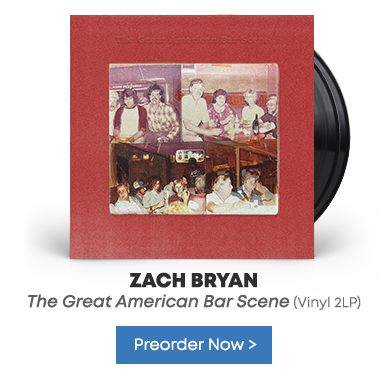Immediately after Michael Fremer submitted a contribution to "Notes," I got a call from my long-time coworker, Bes Nievera. Unbeknownst to me, Bes had been working on a longer piece about the very same album, Avalon, by Roxy Music. I had known of Bes' love of all things Bryan Ferry, and Avalon in particular. So I told Bes to submit it right away and we could run the pieces back-to-back. After all, the album means a great deal to many.
A little about my own history with Bes: I met him more than 20 years ago on the very first day I interviewed to work at Music Direct. Bes initially greeted me with his typical warmth and kindness. I have been lucky to call Bes one of my good friends ever since. Those of you who know him certainly know he is great a lover of music. I run into him at so many local concerts that my wife and I always keep an eye out for him at every event we attend. He is also a film fanatic and possesses an encyclopedic knowledge of old movie minutia. Plus, he's a tremendous chef and our in-house barbeque master at Music Direct. Twice a year, he preps and prepares a large lunch for everyone and goes all out for the entire staff. He's a good guy.
Something you might not know is I made Bes get ordained to officiate my wedding. My wife and I decided to surprise our friends and family with a small flash-mob wedding, and with only a few weeks to get the planning done, we needed someone we trusted – as well as someone who cared about us – to perform the ceremony. Bes couldn't have been more perfect, and while I do not want to embarrass him, he got a little emotional when I asked him. He was so comfortable up there with his beaming smile. He is extremely personable, and my whole family ate him up. Word quickly spread of his prowess, and Bes has now officiated a handful of other weddings. So, any of you who wish to tie the knot, he works pretty cheap. I hope you enjoy reading his musings on Avalon as much as I did.
Today's Special Guest Contribution: Roxy Music Avalon, or How Bryan Ferry and Roxy Music Changed My Worldview of Music
By Bes Nievera, Longest-Tenured Music Direct Personality/Internet-Ordained Minister/Passionate and Sensitive Man
Whenever I'm asked "What is your favorite band?," I always slyly reply, "Bryan Ferry and Roxy Music...because everyone else is just a band." Before I began making that statement however, my world had been spinning against the backdrop of what has become a near four-decade career in audio, searching, searching....
In the spring of 1982, and the advent of the CD just around the corner, my adventures in music were developing, albeit slowly. Sony's fast-improving Walkman was my traveling companion, cassettes neatly packed in my traveling case and loaded with my favorite mixes, thematically prepared for the daily commute from home to my first full-time job at Pacific Stereo, then a chain of stores throughout the Chicagoland area and owned by CBS. In those days, everything from a $99 turntable to the best separates of the day were mine to explore. From classic Advent loudspeakers to SAE amps and separates, I was in a playground that would keep me wanting more for the next 38 years.
In those days, selling gear wasn't as much of an exploration of the equipment's quality or audiophile habits that draw us into the music. Instead, it was an ongoing movement to sell a ton of gear with mostly lackluster sonics and high profit margins. Demoing a system was as easy as pressing a button on a console to match the amp, source player, and speakers together. My attitude was the complete opposite: Craft a system that truly represented the customer's needs, and worry about margins later. As a result, my sales performance initially suffered, but as my career evolved, customer satisfaction, referrals, and repeat business were among the rewards – with music the ultimate tonic for those seeking the best from their favorite recordings.
By that time, my music selection had changed from the AM-tuned three-minute ditty to the FM long play. Beethoven, Miles Davis, and Led Zeppelin were the new normal and became part of my demo material as the years went on. But my one constant was buying every Roxy Music or Bryan Ferry single, maxi-disc, or album released. The group was growing on me. Roxy was that unusual band, always leaving me to wonder what little gem was coming next.
Roxy's previous efforts were classics in their own right, with an early punk-ish, glam-era sound maturing to a grittier, funkier flavor. However, the group would smooth its edgier sound to become more stylistic, fighting against the tide of the new-wave and disco revolutions that ultimately bore the likes of Madonna and others. The collective's most recent efforts, Flesh + Blood (1980) and Manifesto (1979), strove to work through such chaos but were met with mixed reviews. I hoped the next effort would change that. The advance single from Avalon, a slightly shortened version of "More Than This," had been issued a month earlier and gave clues something remarkable was forthcoming. When Avalon was released on May 28, 1982, I had no idea what would happen next as I picked up my copy.
From the outset, I was stunned at the album's look and sound. The cover, unlike previous albums, wasn't laced with the usual sexiness we associated with a Roxy album. What we saw was a mythological Arthurian-themed scene by Antony Price and Ferry, depicting model and the latter's future spouse, Lucy Helmore (1959-2018), holding a falcon at a lake near her family's home in Ireland – a fitting opening to a most evocative album that become the high-water mark in the band's long history.
On first spin, the production work of Rhett Davies and mix from star engineer Bob Clearmountain once again showed the Roxy touch to which we had been accustomed, all fleshed out in stunning analog detail. Ferry, guitarist Phil Manzanera, and reedman Andy McKay were surrounded with many well-known musicians of the era, lending talents in a torrent of sonic cool on each of the ten tracks. "More Than This" and "The Space Between" were among the beaming odes to heartbreak and a great start to the first side. Additional spins through the album shed light on my personal favorite, "To Turn You On," and "The Main Thing." As for the title track? Indelible and timeless.
Indeed, when "Avalon" played, it was the dreamiest music I'd ever heard. That slow samba, McKay's solo, the vocals of Yanick Etienne. It held me in its four-minute grip and would become the most-played track on the album. It was 80s electronica and new-wave sanded down to a soft glow, with guitars, percussion, and Bryan's deliberate croon – a salute to the pleasure of that first glance when the party's over. Every other song I enjoyed before it, from Steely Dan's "Black Cow" to Fleetwood Mac's "Rhiannon," seemingly disappeared from my memory. "Avalon" took my inner book on how to appreciate a song and delicately ripped it up to shreds, replacing it with a sensuous technicolor spectacle, MGM dancers and all.
The album also forever changed my worldview of music; no longer would I be chained to oeuvre of other bands with their "same old thing." Instead I'd scope out anything I could hear and embrace it with equal vigor. Classic recordings from Cole Porter, George Gershwin, and more by Fred Astaire, Jo Stafford, Nancy Wilson. Thelonious Monk, John Coltrane, but also Pat Metheny and others. Beethoven gave way to Vaughan Williams, and later John Adams and Steve Reich. Performers like Evelyn Glennie, Laurie Anderson, Nick Cave, and others were open game, and all because of that moment when I played the final studio album that cemented the musical arc of Ferry and Roxy Music. It's still playing as you read this.
7th May 2020




































